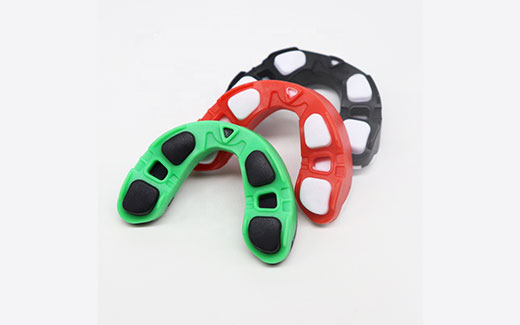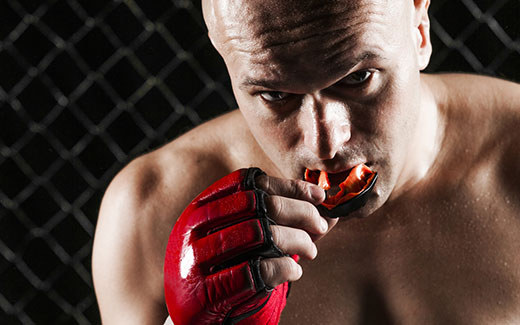Dentists recommend the use of mouth guards to prevent dental abrasion from teeth grinding, relieve painful symptoms of temporomandibular joint (TMJ) disorder and prevent oral injury from physical contact activities.
Mouth Guard FunctionWhether they are worn for dental protection during sporting activities or to alleviate unhealthy dental conditions, mouth guards are designed to realign facial and jaw muscles. At our clinic we strive to meet the needs of each individual for personalized mouth guard fit and function.
Through digital imaging patient-specific mouth guards are created to precisely suit the individual’s oral dimensions for healthy muscle function and protection. How mouth guards are positioned within the mouth impacts muscle contraction and relaxation.


Mouth Guards for Sport
Sports persons may benefit from custom-made mouth guards to protect their teeth from damage during sporting activities, particularly in cases of contact sport. We assess the needs of each individual and provide them with choices in mouth guards.
Mouth guards used in sport prevent oral trauma and dental damage, shielding the upper and lower teeth during impact. Wearing a sports mouth guard protects the outer tooth enamel surface from wear, which may otherwise expose the inner dentin and dental pulp to sensitivity and infection.
Tooth fracture and breakage may occur when teeth of the upper and lower arch clash or if oral injury occurs during a sporting activity. The sports guard is designed to reduce risk of injury and dental damage. Mouth guards are made bespoke for the specific type of sport played, such as boxing, rugby or football, wrestling, karate and hockey.
All mouth guards are quality-tested, removable and made for comfortable fit, wear and ease of cleaning. We use cutting-edge technology for precise mouth guard design to enhance sporting performance.
Mouth Guards for Bruxism or Teeth GrindingDepending on the individual’s diagnosis and needs, mouth guards may treat teeth grinding or bruxism conditions where tooth contact wears down and exposes the dentin. Teeth may then become increasingly sensitive to temperature changes and be at risk of decay and infection.
Mouth guards protect teeth from enamel-wear and preserve oral health. Night mouth guards are designed to be worn during sleep when teeth grinding occurs, or may be worn during the day to prevent the habit if caused by anxiety.
Dentists may refer patients for treatment of the underlying cause of bruxism while providing mouth guard treatment
Benefits of Mouth GuardsMouth guards not only intended to protect dental structures from damage, but they also relieve painful symptoms caused by teeth grinding and TMJ. Jaw, facial, head and neck pain may cause tiredness and feelings of discontent. Mouth guards alleviate this pain and provide individuals with more comfort, energy and positive feelings.
Sports people in particular need to feel energetic for competitive edge and endurance during games. Sport mouth guard treatment provides greater relaxation, comfort and safety for sports people to excel.
Mouth Guards for Temporomandibular Joint (TMJ) DisorderMouth guards are also used to treat individuals with temporomandibular joint (TMJ) disorder. Individuals with TMJ experience jaw pain that may extend to the face, head and neck. The pain is caused by overexertion of connecting muscle.
DENTAL SPORTS INJURIESDental sports injuries, particularly in contact sports such as rugby and ball games like cricket and hockey, are increasingly common. Many dental emergencies are a result of oral injury from a sporting event. Adults, teenagers and children may all experience dental sports injuries
An oral or dental injury as a result of a sporting activity may lead to tooth damage, tooth loss, oral infection and a loss of confidence. Toothache, jaw pain and oral discomfort may also cause headaches and pain radiating through the face and into the neck and back.
Therefore, treating a dental sports injury as an emergency by contacting an emergency dentist for treatment will enable the injured person to receive the dental care they need for pain relief, tooth restoration and healthy oral function. Serious dental injuries may lead to medical emergencies. At the very least the injured person should be checked by an emergency dentist if their mouth is injured.
Mouth injuries can affect eating choices, chewing ability, appetite and word pronunciation for speech. If left untreated teeth may compensate for the injury by moving out of the natural tooth position, thus resulting in misaligned teeth and malocclusion. Orthodontic care may then be required but can be avoided through proper emergency dental care.
Receiving proper dental and medical care for sporting injuries is essential for healthy recovery from trauma. Typical sports injuries requiring emergency treatment include:
- A knocked out or avulsed tooth
- A fractured, broken, split, chipped or cracked tooth
- A dislodged tooth or teeth forced into the gum line and jaw
- Oral cuts to the gums, jaws, tongue, mouth and lips
- Damage to orthodontic devices or tooth restorations
